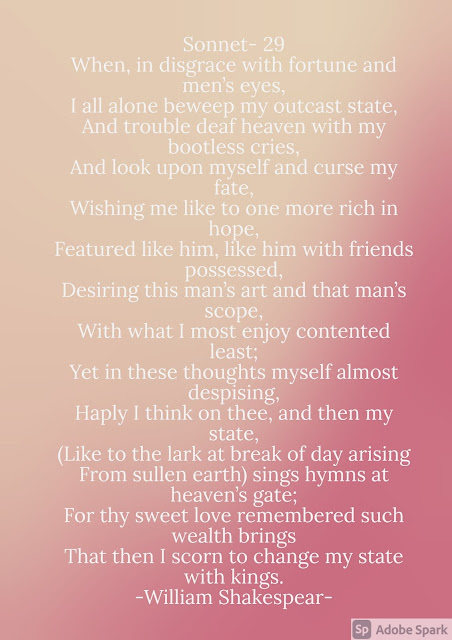Sonnet 29 by Shakespeare
William Shakespeare (1564-1616)
- The greatest writer in the English language.
- He was an English poet, playwright, and actor.
- He is considered the national poet of England.
- Shakespeare has written more than 30 plays
- His plays can be categorized into three groups- tragedy, history, and comedy.
- Apart from the plays he has also written 154 sonnets as well.
SHAKESPEAREAN SONNET.
Shakespeare has written 154 sonnets. Sonnet is a fourteen-lined lyrical poem that can be sung with the accompaniment of musical instruments. Primarily sonnets can be classified into two groups British sonnet or Shakespearian sonnet and Italian sonnet or Petrarchan sonnet. A Petrarchan sonnet can be divided into two parts octave and sestet. Similarly, a Shakespearian sonnet also can be divided into two parts, quatrains, and a couplet. The first part of the sonnet presents a problem and the second part presents a solution for the same. Shakespearian sonnets address two individuals- a young man and a dark lady. The first 126 sonnets address\ man and the second 28 sonnets address a mysterious dark lady.
INTRODUCTION TO SONNET 29.
Sonnet 29 is one of the most famous sonnets written by William Shakespeare. The sonnet shows the insecure, hopeless, helpless situation of the poet. Now he feels unlucky, shamed, and jealous toward others. He feels desolated and isolated from the others. He is no more in an optimistic state. But the reason for his anguish is a mystery he did not disclose it in front of the reader. Ones he was the one who led his life with all fortunes but unfortunately now falls from gracefully to disgraceful situation. But at the end of the poem, the poet feels happiness by thinking about the sweet love of his beloved friend. Like any other sonnets, Sonnet 29 also presents a problem in quatrains and a solution in couplets.
LINE BY LINE ANALYSIS.
In the first two lines, the poet shows his outcast situation. He feels like an isolated one from his friends. No one is there to listen and support him, Weeping is the only thing now he can do. In 1592, there was an outbreak of plague in England. As a result, all theatres were closed and he was jobless. This may be one of the reasons to feel poet so painful. Another reason may be the bitter attack on him by his contemporary writer, Robert Green. The poet did not disclose the reason for his anguish anywhere in the poem.
In the third and fourth lines poet says that even God is also not ready to listen or answer his prayer. The poet feels his cries are worthless and valueless because god is also not answering him. As result, he has started to curse himself and started to hate himself by thinking about the current situation. 'Deaf heaven' is a literary device called personification
In the next four lines poet shows his wish to improve from the current situation. And he wanted to be an optimistic and hopeful man. He wanted to become a particular man who is more handsome and possesses more friends. The man gets more recognition and acceptance from society and he is the one who possesses multiple skills than the poet. The poet has many things that can make him happy but those things are not capable to bring satisfaction to his life. Therefore the poet feels jealous towards the man who has everything that the poet lacks.
In the ninth and tenth lines poet says that whenever he thinks about the current situation, feels hatred toward himself. But whenever he thinks about his beloved friend, he feels more comfortable. Poet forgets all his pain and anguish when thinks of his friend.
In the eleventh and twelfth lines poet says that whenever he thinks of a friend, he feels like a skylark who is happy with an early morning as it is a beginning of a new day. Skylark expresses his joy with a new day or new beginning by sing-song. Like a skylark in the early morning, the poet also feels comforted when thinking of his friend.
In the couplet lines poet says that he is more contented or satisfied and feels most comfortable when thinking about a friend's love. Now he feels more joyful than a king. He forgets every anguish when thinking about the love of his friend. The memory of his friend and love gives him new energy to lead a hopeful life.
LITERARY DEVICES IN SONNET-29.
Personification.
Personification is one of the literary devices used in the sonnet. By using personification poet attributes human qualities and features to nonhuman objects. In the sonnet, the poet uses ''deaf heaven as a personification. Deafness is a human quality or feature but here in the poet attributes to heaven. Such attribution of human quality to non-human objects is known as personification.
Simile.
Simile is another literary device that uses to compare directly two unrelated objects by using the words 'like' or 'as'. Here in the poem poet compares his state with lark.
Like to the lark at break of day arising From sullen earth sings hymns at heaven's gate;
Whenever daybreak comes, lark feels happier and sings beautiful songs. The same way whenever the poet thinks of his friends and his love feels happier and joyful. Night creates an unpleasant state for skylark and it feels comfortable only in the daytime. The same thing happened in the case of the poet as well. When the poet thinks of his state feels miserable but he feels joyful only whenever he thinks of the friend's love.
We will update very soon, stay tuned

Post a Comment